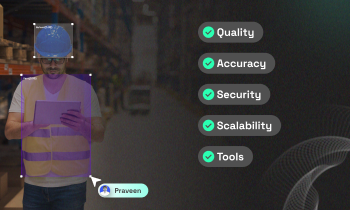What QA process ensures accuracy of dictation datasets?
Data Validation
Healthcare
Speech AI
Accurate dictation datasets are crucial for training automated speech recognition (ASR) systems effectively, especially in the medical field. These datasets, consisting of single-speaker audio recordings where clinicians document patient information, are distinct from conversational datasets due to their structured and terminology-rich nature. The quality assurance (QA) process for these datasets employs a comprehensive approach, focusing on both audio quality and content accuracy.
The Importance of a Robust QA Process
A robust QA process directly enhances the performance and reliability of ASR systems. In medical contexts, accurate transcriptions ensure correct interpretation of medical terminology, which is vital for patient safety and clinical applications. Poor QA can lead to transcription errors, resulting in misdiagnoses or inappropriate treatments. Thus, a well-defined QA process not only improves transcription accuracy but also builds trust in AI-driven medical applications.
The QA Process for Dictation Datasets
The QA process begins with automated checks to assess the technical integrity of audio files. These checks confirm that audio recordings meet minimum specifications, such as a 16 kHz/16-bit PCM WAV format. Ensuring high audio quality is crucial for effective transcription and subsequent analysis.
After automated checks, audio files undergo a human transcription review. This involves a two-pass process:
- Linguist Review: A linguist with medical training transcribes the audio, capturing verbatim speech, including hesitations and corrections. This maintains the authenticity and accuracy of the dictation.
- Medical Review: A clinician reviews the transcription for terminology accuracy, ensuring that medical terms are correctly transcribed and formatted. The goal is to achieve at least 98% accuracy for cleaned transcripts.
Metadata and Compliance
Comprehensive metadata accompanies each recording, detailing device type, recording environment, and speaker specialty. Compliance with regulations like HIPAA and GDPR is critical, requiring thorough audits to ensure no protected health information (PHI) is present. Contributor consent is documented and strict data handling protocols are enforced.
Ongoing Monitoring and Audits
To maintain high standards, ongoing monitoring and daily spot checks are implemented. These ensure deviations from quality thresholds are promptly identified and addressed. Regular audits of transcription accuracy and terminology error rates help maintain performance.
Challenges in QA for Dictation Datasets
Challenges in QA for dictation datasets include audio quality oversight, inadequate reviewer training, and neglecting metadata. Compromising on audio quality due to rushed data collection can lead to transcription issues caused by background noise or poor recording conditions. Insufficient training for linguists and medical reviewers can lead to inconsistencies in terminology or transcription errors. Continuous training and updates on medical vocabulary are essential. Comprehensive metadata is crucial for dataset usability, facilitating effective analysis and retrieval.
Conclusion
In summary, a rigorous QA process is fundamental for ensuring accurate dictation datasets in medical contexts. By combining automated checks with thorough human review and compliance measures, organizations can produce high-quality datasets that significantly enhance ASR system performance. This multi-layered approach safeguards data integrity and builds trust in AI applications reliant on accurate clinical documentation.
By employing a structured QA approach, FutureBeeAI ensures that the dictation datasets it provides are accurate, reliable, and compliant, making them an invaluable asset for enhancing medical ASR systems.
What Else Do People Ask?
Related AI Articles
Browse Matching Datasets
Acquiring high-quality AI datasets has never been easier!!!
Get in touch with our AI data expert now!








